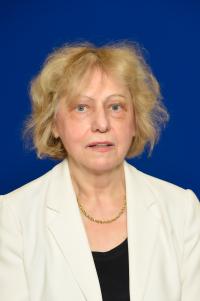Emilia Oleszak
By Tiffany Whitfield
Various coronaviruses have circulated in the population for years, but the virus that causes COVID-19, known as SARS-CoV-2,is "one of the most contagious outbreaks," says Emilia Oleszak, virologist and associate professor in the Department of Biological Sciences at Old Dominion University.
"In comparison to the SARS and MERS coronavirus outbreaks, the current SARS-CoV-2 pandemic resembles the so-called 'Spanish influenza' from the epidemiological point of view," Oleszak said about the 1918 pandemic. "Spanish flu infected 25-30% of the global population and killed approximately 40 million individuals, with a mortality rate of about 2%."
Oleszak has investigated coronaviruses for approximately eight years, at the University of Texas Health Science Center, Medical School at Houston and Temple University School of Medicine in Philadelphia. She studied the mechanism of damage to the myelin sheath of nerve cells induced by Mouse Hepatitis Virus (MHV). MHV is a coronavirus and is used in one of the viral animal models to study an inflammatory demyelinating disease that resembles multiple sclerosis (MS).
At ODU, Oleszak is continuing her studies on demyelinating diseases of the central nervous system and in particular MS in humans, which likely is caused by viral infections, as well as on the role of the immune system in the etiology/pathogenesis of schizophrenia.
"Coronaviruses infect a variety of host species, including humans and several vertebrates, and cause many respiratory and intestinal tract infections," Oleszak said, "and in humans, less pathogenic coronaviruses normally cause a mild, cold-like respiratory illness."
Oleszak said coronaviruses have RNA as their genomes and are known for their high frequency of recombination (exchange of genetic material), which contributes to their rapid evolution. Technology is helping to speed the sequencing of the viral genomes.
"Currently, using next-generation sequencing, the genome of SARS-CoV-2 isolated from a patient sample can be sequenced within hours," Oleszak said. "This technology allows scientists and epidemiologists to trace epidemics. For example, a cluster of COVID-19 infections in Brazil, Mexico, Switzerland, Scotland and Germany has been traced by sequencing to one patient in Italy, who had traveled to China."
She said scientists have yet to "definitively identify the intermediate host for SARS-CoV-2."
"This transmission is the result of human activities, such as urbanization and ever-increasing agriculture that create inroads into the habitats of the natural hosts of this virus," she added. "To put it in simple terms, keeping different live animals infected with species-specific coronaviruses in close proximity to each other is the recipe for a potential pandemic."
Because there's no specific antiviral drug or vaccine for COVID-19, quarantines of 14 days without new infections are the only way to prevent its spread, Oleszak said. "The treatment of patients with SARS-CoV-2 pneumonia is purely supportive, such as being placed on ventilators to aid breathing," she added.
Laboratories worldwide are working around the clock studying coronaviruses and investigating their mechanisms of infection to deaccelerate current pandemic and prevent the next one.
Clinical trials are underway based on the treatment of SARS-CoV-2 patients with the most severe disease with interferon alpha or drugs that were effective in the treatment of other viral infections, including HIV, Ebola or MERS-CoV.
"Treatment with human convalescent sera (serum from patients who have recovered from this infection) that contains neutralizing antibodies against the virus are being tested to prevent and treat COVID-19," Oleszak said. "The efficacy of this approach is not known at the present time."
Related News Stories
ODU Dietician Offers Advice that Might Help You Fight Off Coronavirus
Tracy Conder says a healthy diet and getting enough sleep boosts our immune systems. (More)
New Plan Announced for Commencement
University offers graduates and families multiple options to celebrate their milestone. (More)
Keep Calm and Keep Teaching
ODU’s Center for Learning and Teaching is ready to assist faculty with the transition to online classes. (More)







